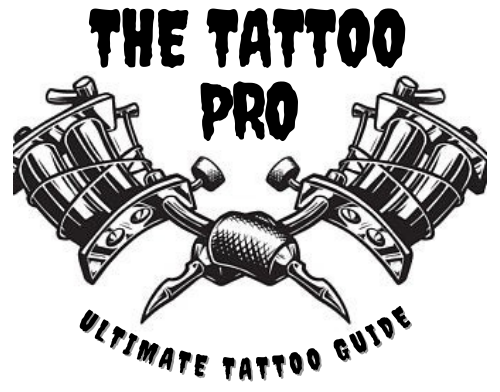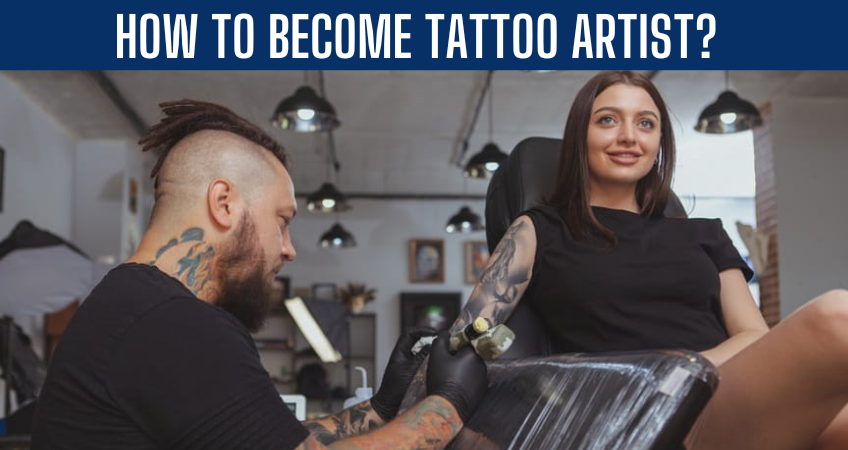Table of Contents
Tattoo Artist
A job as a tattoo artist may be right for you if you’re a highly creative person who loves art and design enjoys dealing with people and wants to create meaningful work that will last a lifetime. It takes years of arduous work and devotion to your trade to become a tattoo artist, but it can result in a lucrative career. We go through what a tattoo artist is, what they do, and the steps you can take to launch your career as a tattoo artist in this post.
What is a Tattoo Artist?
A tattoo artist is a professional who creates body art by permanently inking symbols, patterns, and text onto clients’ bodies. By inserting specialised needles into their skin, ink is embedded during this process. Although every tattoo artist has their unique procedure, most begin by drawing the desired image on paper, making a stencil if necessary, and then applying the pattern to the skin. Tattoo artists exhibit a great level of artistic talent, inventiveness, and accuracy.
What do tattoo artists do?
Tattoo artists collaborate closely with their clients to create tattoo designs, which they permanently engrave on their bodies and might include simple or complex images, patterns, or inscriptions. Clients frequently bring ideas or specific designs to tattoo artists, who then collaborate with them to produce a unique piece of body art. In the event that a customer does not already have a design in mind, tattoo artists also offer design books loaded with tattoo concepts in their particular styles. The process can take hours or even require many sessions, depending on the design.
Salary and job prospects of Tattoo Artists
A tattoo artist makes, on average, $63,684 a year. In order to get significant experience, new tattoo artists generally begin working in established studios before making the decision to develop their own facilities. The profitability of your business may be impacted by a number of variables, including your background, geography, and the state of the economy.
|
Degree Level |
None |
|
Degree Field |
None |
|
Licence/Certification |
Licensure is needed in most states; voluntary certification available |
|
Experience |
3-year apprenticeship recommended |
|
Key skill |
Creativity and artistic ability; tact, patience, and communications skills |
|
Job outlook |
Number of clients & amount of competition depends on location and artistry must be known and appreciated by many as it depends on quality of work |
|
Median Annual salary (2021) |
$63,334 |
|
Source- U.S. Bureau of Labor Statistics, PayScale.com, Indeed.com
|
|
Tattoo Equipements for Beginner Tattoo Artists
Read these following steps to kick start your career as a tattoo artist
-
Receive formal training in tattoo artist
By obtaining a fine arts degree from a university, enrolling in a number of classes, or participating in pertinent workshops, some tattoo artists acquire professional instruction. Formal art instruction can teach you in-depth design principles and provide you the chance to practice producing art for a wide range of purposes. You may have the chance to improve your drawing skills and develop as an artist through formal training.
2. Learn the basic elements of design of tattoo.
By grasping some basic aesthetic concepts, you can develop a full understanding of the many design elements and how they interact with one another. Knowing this is tremendously helpful when creating intricate designs and tattooing someone who already has tattoos. Knowing as much as you can about a wide variety of design components will enable you to put these ideas into practice and develop your skill set and ability to create tattoos of the highest caliber. Important design elements include lines, shape, colour, texture, value, alignment, repetition, proximity, contrast, and space.
3. Developing the tattoo drawing skills
Although having a natural talent for drawing might be advantageous, constant practice is necessary to improve your tattooing skills. designing and creating a variety of artistic designs and styles frequently. It’s typical to begin with pencil sketches and progress to permanent ink. Recognizing your strengths and the distinction between what you can tattoo versus what you can draw takes time. When you initially begin, it’s crucial to practice simple designs.
4. Build your portfolio for the tattoo artist
When beginning your career as a tattoo artist, building a portfolio is essential because it enables potential mentors and employers to swiftly evaluate your work and determine whether they are interested in your specific art style. Your portfolio should be polished and appealing, and it should include your best illustrations and tattoo ideas. For displaying their work, many tattoo artists use binders with sheet protectors. Include art that demonstrates your artistic flexibility and include both dark and colorful works.
A CV and cover letter should be included in your portfolio as it is the finest practice for how to become a tattoo apprentice. Your formal tattoo education and experience of your work should be stated on your CV, and the name of the tattoo artist under whom you want to do an internship should be stated in your cover letter. Keep a primary point about one piece in your CV, a few highlights of your relevant experience and enthusiasm, and other information as appropriate. You might think of buying individual business cards so that you can include them in your portfolio.
5. Obtain an apprenticeship
An apprenticeship is required before one can tattoo professionally. You can begin your apprenticeship with any past mentors you may have had or at any tattoo parlors that are willing to give it. It’s crucial to do your homework on the store you wish to intern at, which should involve taking the time to review each artist’s portfolio and critical information about their business.
Apprenticeships offer useful knowledge about tattoo design, tattoo machine operation, sterilizing tattoo equipment, and other sanitary procedures. They can also give you a better outlook on the business aspects of how to run and own a tattoo shop.
6. Get a certification of Tattoo experties
Based on the state or country you are living in, you may be needed to complete special training courses and get a few certifications in order to apply and get licensure. As a tattoo artist, you must stick to proper health and safety regulations, so it may happen that any tattoo courses will focus on disease control and health management and health and safety rules and regulations.
For example, there is a blood-borne pathogen certification that is commonly held by tattoo artists as they learn how to prevent blood-borne pathogens from getting spread, which is important to maintain the safety of the tattoo artist and as well as their clients.
7. Get a licensing tattoo artists.
Requirements for tattoo licensing may vary and depend on your location. The state where you live decides the number of apprenticeship hours you may be required to complete, along with what type of certifications or health and safety courses you may take up in order to apply for licensure. In some states, First aid and cardiopulmonary resuscitation (CPR) certification is necessary. To get licensure, you must take the exam and pay a fee.
Once you get a tattoo artist license, you need to start finding clients. The best way to do so is to use social media platforms extensively. Search your favorite tattoo artists to follow their pages and keep updated with their work. This helps you to build and expand your network, to share your professional work and this will help to get potential clients.
8. Buying necessary tattooing equipment
Most tattoo shops demand from their employees to keep their own tattoo supplies. These supplies may include needles, tattoo guns, ink sets and tubes and skin pens. You need to buy your own hygienic products as well, such as alcohol wipes, gloves, bandages, antiseptic solutions, and cling wrap. It helps to keep track on all the costs of products.
9. Necessary Equipment for tattooing
When applying for an apprenticeship, you need your portfolio. However, the more you advance, the more you wish to invest in some necessary equipment and a basic tattoo kit for your work. Make sure to talk with your mentor before expending any additional money on your equipment. The basic equipments are:
- Rubber surgical gloves
- Stencil paper and a heat-transferring machine
- A power supply with a foot switch
- Various inks including some basic pigmented colours.
- Multiple needle configurations, including tubes and tips for every configuration.
- Ink caps and Vaseline for skin
- Spray bottles are used for soap keeping and one for keeping alcohol.
10. The most important is to Practice, as much as you can
Regular practice is important in taking your design and tattoo skills to an advanced level. Some people suggest practicing on fruit such as oranges peel, while there are people who recommend practicing on synthetic skin for experiencing better and more accurate work such as shading, perfecting the clean lines, and steadiness. Although practice on any of the above is valuable in developing your skills, nothing can compare to practicing tattooing on human skin. If you have someone in your family and friends who are willing to get a tattoo, you can practice your work on them. In the initial days of your career, you can offer tattooing at heavily discounted prices to attract more clients.
List of Some Best Tattoo Artist In the United States
| best tattoo artist in the US | Scott Campbell, Dillon Forte, Don Ed Hardy |
| tattoo artist in Los Angeles | Generation8Tattoo, BLACK TOWER TATTOO STUDIO |
| tattoo artist in New York City | Sarah Gaugler, Bang Bang |
| tattoo artist in Miami | Miami Tattoo & Co Midtown, Ocho Placas Tattoo Company |
| tattoo artist in Chicago | Speakeasy Custom Tattoo, Great Lakes Tattoo |
| tattoo artist in San Francisco | Mission Ink Tattoo & Piercing, Moth and Dagger Tattoo Studio |

